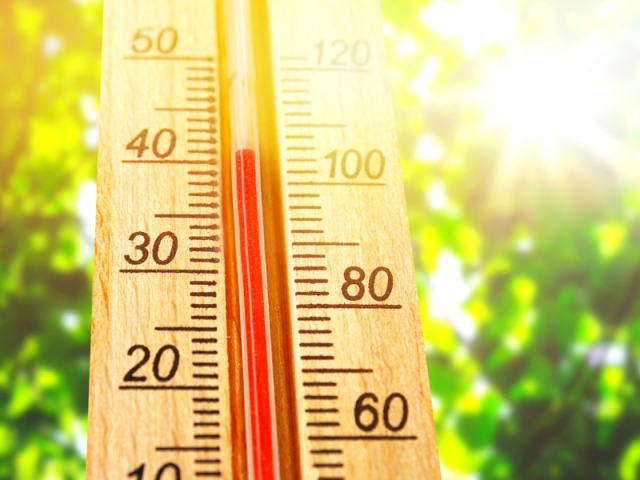Heatwave: tips and tricks to protect your home from the heat © iStock
When the heat sets in, there are simple and effective ways to cool the air inside your home. But which ones? Between the wacky grandmother’s tips and the really effective advice, we help you sort it out.
When summer sets in, temperatures sometimes reach scorching levels. Even if the term “heat wave” only applies when the temperature remains high at night and for an extended period (We speak of a heat wave when the thermometer remains 7 to 10 ° C above the seasonal averages for at least 3 consecutive days and nights), heat waves can be difficult to manage when you are at home.
At home, the air sometimes becomes unbreathable and it becomes hard to sleep in stubborn heat. Outside, the sun’s rays quickly become unbearable – and even the plants suffer from the heatwave!
Fan, damp cloth, ventilation, caulking … Everyone then has their remedy to keep their home cool. But, are all these tips good to follow? What are the most effective ways to cool your home inexpensively in summer? What work needs to be done to improve the thermal comfort of your home in the long term? Maison à part helps you disentangle the true from the false.
And of course, in the event of a heat wave, remember to follow the recommendations of the Ministry of Health for you and your loved ones.
Heatwave: should the windows be opened to cool the house?
In the event of a heat wave, you have to open the windows at the right time of day © gpointstudio – Thinkstock
When it is very hot, you have to open the windows wide to ventilate.
FALSE. When temperatures reach their peaks, better to leave them closed in the middle of the day to prevent hot air from entering inside. While it is not very pleasant to live in semi-darkness, closing windows and shutters is still the best way to insulate the interior of your home and protect it from excessive heat. So it is better towait for the mercury to come down to ventilate. Then open wide doors and windows once the sun has gone down and the air has become fresh again, so that your home can take advantage of this lighter atmosphere and accumulate the coolness of the night.
Heatwave: should the windows be opened to cool the house?
Heatwave: should you draw the curtains to protect your house from the sun?
Pulling the curtains is enough to protect yourself from the sun.
TRUE. Whether it is wooden shutters, metal shutters, louvers, interior or exterior blinds, or just blackout curtains, any medium is good for providing shade in the house. This protects your interior from the sun’s rays, which will increase the temperature in your home even more if the windows are open. Do not forget, therefore, to close them too.
Heatwave: should you draw the curtains to protect your house from the sun?
Heatwave: does installing plants keep the house cool?
Heatwave: does installing plants keep the house cool? © Leroy Merlin
Plants bring freshness to the house.
TRUE. Plants are beneficial in hot weather! It is also often cooler in the garden, or in a park under the trees, than inside the house. Thanks to evapotranspiration, plants release water vapor, which ultimately creates a feeling of freshness. It is therefore interesting to plant greenery around your house, or on your balcony if you live in the city, to create an island of freshness. To enjoy them, especially at night, remember to water them before going to bed, they will restore a little freshness. But your plants can also suffer from the heat wave. Follow our advice to help them protect themselves from the heat.
Heatwave: does installing plants keep the house cool?
Heatwave: is it the same temperature in all the rooms of the house?
Bioclimatic design © MAP
It is the same temperature in all the rooms of the house.
FALSE. It is well known that the north side of the house is always cooler than the south side, exposed to the sun. This is also one of the basic principles of bioclimatic architecture. If you have the possibility, sleep – and especially make fragile people such as children sleep – in rooms located to the north or east, where the temperatures will be the most bearable. Cooler at night, they will be more pleasant. Likewise, prefer rooms on the ground floor rather than upstairs or under the eaves, where the thermometer often reads a few degrees higher.
Heatwave: is it the same temperature in all the rooms of the house?
Heatwave: should the ground be wet to cool the air?
Wet the ground helps to cool the ambient air.
TRUE. The water, heated by the high temperature, evaporates and then creates a feeling of freshness. The slightest draft is then transformed into a very appreciable fresh wind! If your floor covering supports it (tiles, natural stone, etc.), run a very damp mop over it, especially under the windows. If you have a balcony or patio, throwing a bucket of water over it, especially in the morning and evening, will also help bring the temperature down. Otherwise, you can place a damp sheet in front of the windows, or simply dry your laundry near the windows. This will give you an extra feeling of freshness.
Heatwave: should the ground be wet to cool the air?
Heatwave: should a fan be used?
Heatwave: should a fan be used? © iStock
The fan is a very effective solution for cooling off.
True and false. In the early hours of heatstroke, the fan is beneficial and creates an artificial draft in the house. However, if the outside temperatures continue to rise and the accommodation is poorly sealed, the appliance will very quickly brew hot air! A “grandmother’s technique” consists in placing wet clothes in front of the fans, to reinforce the feeling of freshness and to lower the temperature of the ambient air. You can also have bowls or basins filled with ice cubes, which will have the same effect – the ideal being to choose a metal container, which will also diffuse the freshness of the ice cubes.
Heatwave: should a fan be used?
Heatwave: should household appliances be turned off?
Household appliances raise the room temperature.
TRUE. In the event of very hot weather, you are strongly advised to limit the use of electrical appliances that produce heat, in particular ovens and hobs. Likewise, fine-tune your water heater so that it does not heat the room unnecessarily. Also remember to clean the condenser located at the back of your refrigerator: the dust that accumulates there can lead to overheating and overconsumption of energy. Another tip: completely turn off all your electrical devices instead of leaving them on standby. They consume energy and therefore release heat unnecessarily. Finally, if you’re using a laptop, opt for a stand with an integrated fan. Connected to the PC via a USB port, it blows cool air and limits overheating of the device.
Heatwave: should household appliances be turned off?
Heatwave: should the bulbs be changed?
Heatwave: should the bulbs be changed? © iStock
Some light bulbs produce heat and warm the interior of the house.
TRUE. When illuminating, some bulbs, such as halogen bulbs, heat up, sometimes considerably. A room where there are several lamps of this type can then gain several degrees, only because of its lighting! So replace halogen lamps with light emitting diodes (LEDs) that stay cool even when they are on for a long time.
Heatwave: should the bulbs be changed?
Heatwave: invest in work to protect your home from the heat
If you have the opportunity to do larger jobs in your home, here are some great ideas:
Heatwave: invest in work to protect your home from the heat



